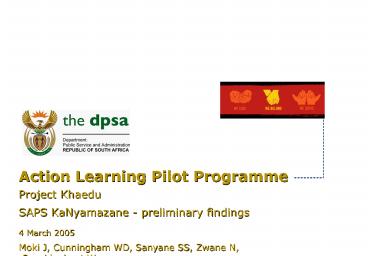Action Learning Pilot Programme - PowerPoint PPT Presentation
1 / 18
Title:
Action Learning Pilot Programme
Description:
... resulting in the Station Commander becoming burdened with non-critical issues ... Senior time is not dedicated to critical line roles e.g. docket inspection ... – PowerPoint PPT presentation
Number of Views:92
Avg rating:3.0/5.0
Title: Action Learning Pilot Programme
1
Action Learning Pilot Programme
- Project Khaedu
- SAPS KaNyamazane - preliminary findings
4 March 2005 Moki J, Cunningham WD, Sanyane SS,
Zwane N, Bezuidenhout W
2
Current situation what weve seen and heard
Process and physical
Organisation design
People management
Financial and procurement
- Large back-log of dockets
- 4,600 outstanding
- Dockets distributed unevenly with many more
ending up with junior detectives (308 in one
case) - Vehicle allocation is uneven between functions
with no allocation to detectives after hours - Resources not mapped to crime statistics or
typical crime patterns e.g. weekends (80 of
crime in one area) - Restricted hours for support services limits
citizen service
- No manager in charge of support services
resulting in the Station Commander becoming
burdened with non-critical issues - Administration support services often headed by
captains with only 2-3 direct reports - At any one time only 8 police (4 vehicles) are
actually visibly patrolling, out of a total
complement of 203 - Multi-agency mechanism not functioning
- Fully resourced station with only 6 vacancies
out of a complement of 217 - One-third of new detectives have very little or
no training (approximately 2 weeks) - Poor discipline and workplace employee assistance
- Staff with alcohol abuse are not being supported
through EAP - AWOL high with commanders often covering for
absent staff - SAPS national guidelines not followed with sick
leave
- Wrong vehicles provided, given the state of the
roads in the area
Except to those on standby Majority of
resources at KaNyamazane mother station
3
The station commissioner has too many direct
reports
Station Commissioner
Visible policing
Functional policing duties
Community Service Centre
Detective Service
CIAC
Logistics
Financial Services
Administration Services
Support Services
Communication Services
HRM
Management Information
4
Customers are unhappy with response times and
general service
1 Very unhappy with service level 5 Very
happy with service level
Source PSW questionnaires, Nov 2004
5
Complications
- Senior management time is heavily consumed in
meetings and workshops (many of which seem to be
unproductive or taking the time of all managers
where only some of the managers are really
needed) - Senior time is not dedicated to critical line
roles e.g. docket inspection leading to
significant backlogs - Skills development planning appears weak
- A numbers game instead of focusing on real
operational needs - Crime statistics are not actively used to manage
and allocate resources
6
Docket backlogs are a problem and were growing
7
however it is clear that active management can
reduce this
8
but senior (experienced) line management spend
significant time in meetings
9
Many dockets should not be being pursued if
senior management time is invested up front
ESTIMATED
Approximate
10
The docket backlog inevitably results in few
cases being successfully investigated through to
court
11
and the actual conviction rate is low (lt10)
12
If the real criminal cases were focused on,
actual cases per detective would drop dramatically
13
Vehicles supplied are inappropriate to needs
80 of roads are un-tarred and impassable except
by 4x4 in rainy conditions and we dont have any
14
The allocated vehicles are unsuitable
15
for the environment
16
for the environment
17
leading to frequent damage and breakdowns
18
Suggested Actions
- Institute a Crime office manned by a senior
officer to screen dockets for harassment and
unactionable before sending to detectives - Reduce meeting load on senior staff and focus on
core functions e.g. docket inspections - Establish as per national directive for FCS units
to deal with child abuse, sexual offences and
domestic violence issues as this will decrease
workload of station by approximately 20 - Engage with roads and housing agencies to
formalise the rural and informal areas to
provide road and address demarcation - Replace some existing vehicles with 4X4s even if
this reduces the total number available - With the freed up time of staff, invest heavily
in - More visible policing in high crime areas and at
weekends (all officers should patrol during the
month irrespective of function or seniority) - Extending hours to provide better services to
citizens - Capacity building, particularly for detectives
- Allocate resources by crime statistics and need































